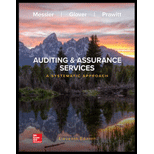
Introduction:
The Code of Professional Conduct of the American Institute o Certified Public Accountants describes Principles and Rules. The principles provide the framework for the rules which govern the performance of professional services by members. It outlines CPAA’s ethical and professional responsibilities. The code establishes Principles which are: Public Interest, Integrity, Objectivity, Independence, Responsibility and Due care.
The AICPA membership adopted the Code of Professional Conduct (the code) to provide guidanceand rules to all members in the performance of their professional responsibilities. The code consists ofprinciples and rules as well as interpretations and other guidance. The principles provide the framework for the rules that govern the performance of their professionalresponsibilities.The AICPA bylaws require that members to adhere to the rules of the code. Compliance with the rulesdepends primarily on members’ understanding and voluntary actions; secondarily on reinforcement bypeers and public opinion; and ultimately on disciplinary proceedings, when necessary, against memberswho fail to comply with the rules.
The AICPA sets ethical standards for the profession and U.S and auditing standards for private companies, non profit organizations, federal, state and local governments.
To select: The correct option.
Want to see the full answer?
Check out a sample textbook solution
Chapter 19 Solutions
EBK AUDITING & ASSURANCE SERVICES: A SY
- Business/Professional Ethics Directors/Executives...AccountingISBN:9781337485913Author:BROOKSPublisher:Cengage
 Auditing: A Risk Based-Approach (MindTap Course L...AccountingISBN:9781337619455Author:Karla M Johnstone, Audrey A. Gramling, Larry E. RittenbergPublisher:Cengage Learning
Auditing: A Risk Based-Approach (MindTap Course L...AccountingISBN:9781337619455Author:Karla M Johnstone, Audrey A. Gramling, Larry E. RittenbergPublisher:Cengage Learning  Auditing: A Risk Based-Approach to Conducting a Q...AccountingISBN:9781305080577Author:Karla M Johnstone, Audrey A. Gramling, Larry E. RittenbergPublisher:South-Western College PubPrinciples of Accounting Volume 1AccountingISBN:9781947172685Author:OpenStaxPublisher:OpenStax College
Auditing: A Risk Based-Approach to Conducting a Q...AccountingISBN:9781305080577Author:Karla M Johnstone, Audrey A. Gramling, Larry E. RittenbergPublisher:South-Western College PubPrinciples of Accounting Volume 1AccountingISBN:9781947172685Author:OpenStaxPublisher:OpenStax College Intermediate Accounting: Reporting And AnalysisAccountingISBN:9781337788281Author:James M. Wahlen, Jefferson P. Jones, Donald PagachPublisher:Cengage Learning
Intermediate Accounting: Reporting And AnalysisAccountingISBN:9781337788281Author:James M. Wahlen, Jefferson P. Jones, Donald PagachPublisher:Cengage Learning





